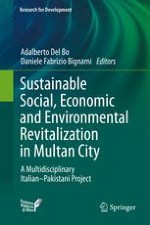2014 | OriginalPaper | Chapter
5. Microcredit System for Building Rehabilitation and Strengthening Arts and Crafts
Authors : Claudio Di Benedetto, Irene Bengo
Published in: Sustainable Social, Economic and Environmental Revitalization in Multan City
Publisher: Springer International Publishing
Activate our intelligent search to find suitable subject content or patents.
Select sections of text to find matching patents with Artificial Intelligence. powered by
Select sections of text to find additional relevant content using AI-assisted search. powered by
